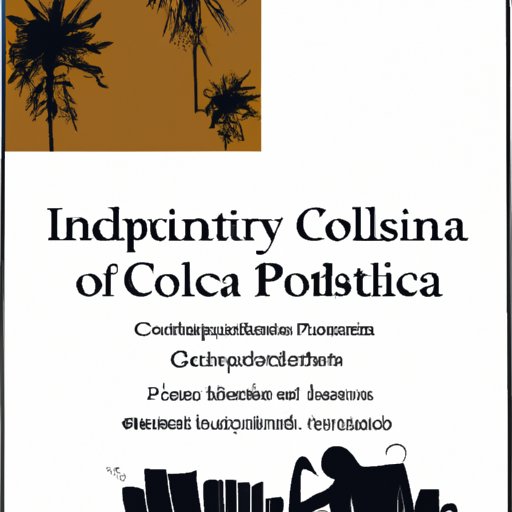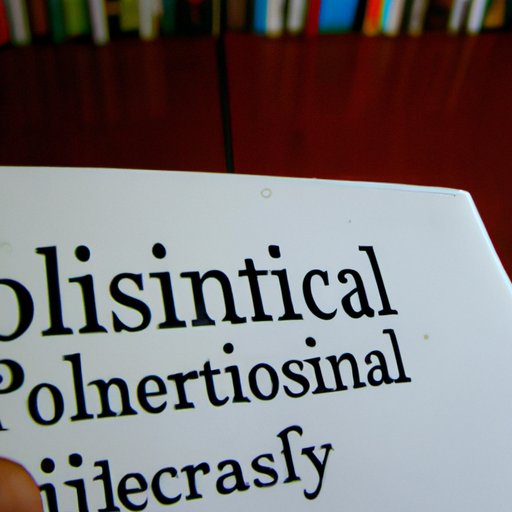Introduction
Postcolonial literature is a term used to describe texts written by authors from formerly colonized countries. These texts often explore the impact of colonization on both the colonized and the colonizers, as well as how people in formerly colonized countries have responded to their colonial histories. Postcolonial literature can be found in all genres, including novels, poetry, plays, and short stories. In this article, we will explore the definition of postcolonial literature, its historical context, themes, characterization, reception, and impact on society.

Examining the Definition of Postcolonial Literature
Postcolonial literature is a term used to refer to literary works that are created by authors from formerly colonized countries. These authors often use their writing to explore the effects of colonialism on both the colonized and the colonizers, as well as how people in formerly colonized countries have reacted to their colonial histories. Postcolonial literature can be found in all genres, including novels, poetry, plays, and short stories.
The importance of postcolonial literature cannot be overstated. It helps to bring attention to the experiences of those who were colonized and to challenge Eurocentric narratives. It encourages readers to think critically about the legacy of colonialism and to consider how it has impacted the world today. By exploring the effects of colonialism on both the colonized and the colonizers, postcolonial literature can help to foster understanding and empathy between different cultures.
Historical Context of Postcolonial Literature
In order to understand postcolonial literature, it is important to examine its historical context. Colonization took place in many parts of the world throughout history, with European powers such as Britain, France, and Spain establishing colonies in Africa, Asia, and the Americas. During this time, the colonizers imposed their own laws, customs, and language upon the colonized, often leading to the suppression of indigenous cultures and peoples.
Postcolonial writers have responded to colonialism in a variety of ways. Some have used their writings to criticize the actions of the colonizers and to explore the experiences of those who were colonized. Others have written about the resilience of the colonized in the face of adversity, or the strength of their cultures and traditions despite attempts to suppress them. Postcolonial writers have also explored the complex relationships between the colonized and the colonizers, and how these relationships have shaped their lives.
Exploring Themes in Postcolonial Literature
Postcolonial literature often explores a range of themes, from the effects of colonialism on the colonized to the struggles of those living in formerly colonized countries. Common themes in postcolonial literature include identity, displacement, resistance, and power. Writers often use their work to explore how colonialism has impacted people’s sense of self, as well as the struggles they face in their daily lives.
Postcolonial writers often use language to explore these themes. They may use metaphors and symbols to illustrate their ideas, or use dialect to create a sense of authenticity. By doing so, they are able to convey complex ideas in an accessible way, and to create vivid portrayals of life in formerly colonized countries.
Analyzing Characterization in Postcolonial Literature
Characterization is an important element in postcolonial literature. Writers often use their characters to explore how colonialism has impacted people’s lives, and to show how individuals have responded to their colonial histories. Characters in postcolonial literature are often portrayed as resilient and resourceful, and their stories can be seen as a form of resistance against colonialism.
The portrayal of characters in postcolonial literature can also offer insight into how colonialism has impacted the lives of those who were colonized. Writers often use their characters to explore issues of race, class, and gender, and to illustrate how colonialism has created inequality and oppression. By examining how characters are portrayed in postcolonial texts, readers can gain a better understanding of the experiences of those who were colonized.

Comparing Postcolonial Literature to Colonial Literature
One way to understand postcolonial literature is to compare it to colonial literature. Colonial literature was written by authors from the colonizing nations and often served to glorify their own culture while demonizing the colonized. In contrast, postcolonial literature is written by authors from formerly colonized countries and offers a different perspective on colonialism. Postcolonial writers often subvert colonial narratives by presenting alternative views of the colonized, and by challenging the stereotypes and assumptions that were perpetuated by colonial literature.
Postcolonial literature can also provide insight into how colonialism has shaped contemporary society. By looking at how postcolonial authors have responded to their colonial histories, readers can gain a better understanding of the legacy of colonialism and how it has impacted the world today.

Understanding the Impact of Postcolonial Literature on Society
Postcolonial literature can have a powerful impact on society. By bringing attention to the experiences of those who were colonized, postcolonial literature can challenge dominant narratives and encourage readers to question accepted beliefs about the world. By exploring issues of race, class, and gender, postcolonial literature can also help to foster understanding and empathy between different cultures.
Postcolonial literature can also be a powerful tool for social change. By highlighting the struggles of those living in formerly colonized countries, postcolonial literature can draw attention to the injustices endured by these communities and encourage readers to take action to address the issues faced by the colonized.

Investigating the Reception of Postcolonial Literature
Postcolonial literature has been received differently by different audiences. In some cases, postcolonial literature has been embraced by readers as a valuable tool for understanding the legacy of colonialism. In other cases, it has been dismissed as too political or too critical of the colonizers. However, regardless of the reception, postcolonial literature has had a lasting impact on contemporary writing.
Postcolonial literature has influenced the work of many contemporary authors, who have drawn inspiration from the themes and techniques used by postcolonial writers. As a result, postcolonial literature has helped to shape the current literary landscape, and its influence can be seen in a wide range of genres and styles.
Conclusion
Postcolonial literature is an important genre of writing that helps to bring attention to the experiences of those who were colonized and to challenge Eurocentric narratives. By exploring the effects of colonialism on both the colonized and the colonizers, postcolonial literature can help to foster understanding and empathy between different cultures. It can also be a powerful tool for social change, drawing attention to the injustices endured by those living in formerly colonized countries and encouraging readers to take action.
Postcolonial literature has been received differently by different audiences, but its influence can be seen in the work of many contemporary authors. It is clear that postcolonial literature has had a lasting impact on the literary landscape, and its importance should not be overlooked.
(Note: Is this article not meeting your expectations? Do you have knowledge or insights to share? Unlock new opportunities and expand your reach by joining our authors team. Click Registration to join us and share your expertise with our readers.)
